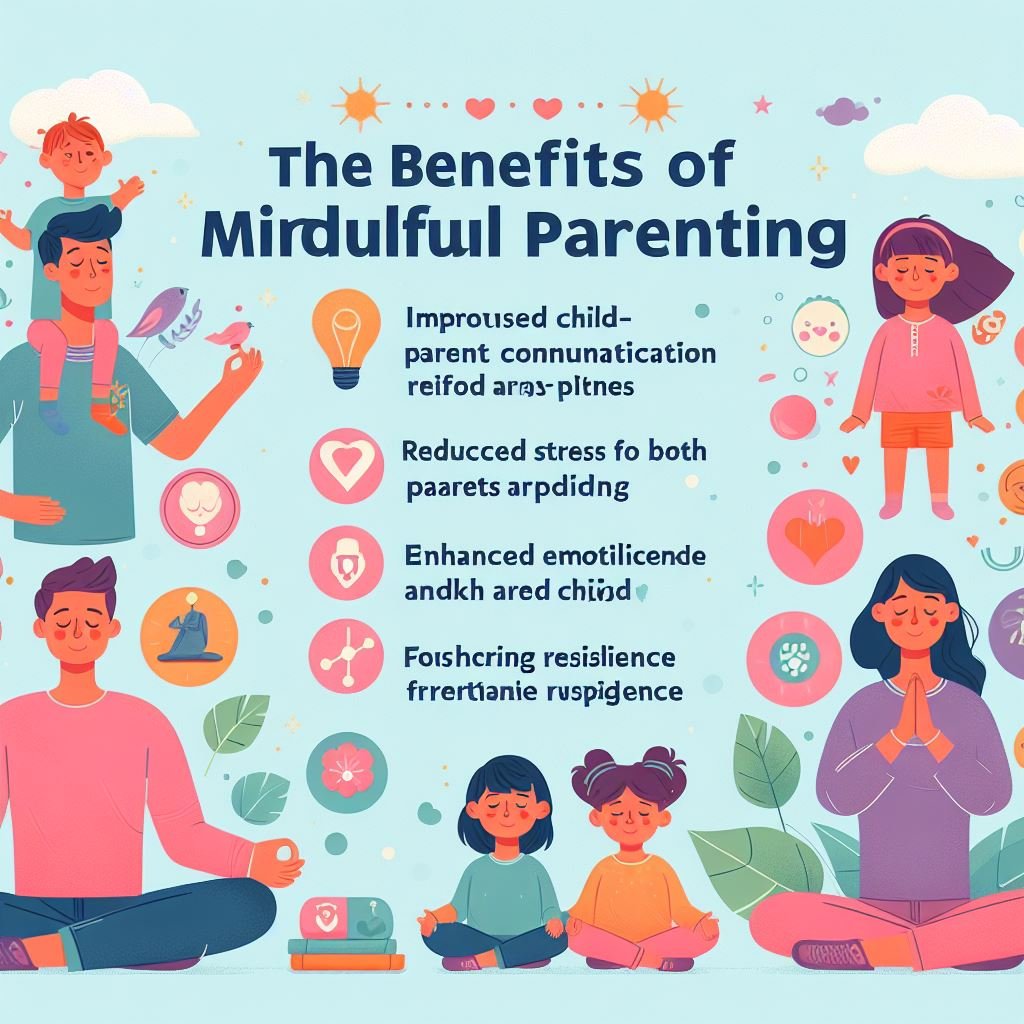Have you ever found yourself lost in a whirlwind of thoughts, completely oblivious to your child’s chatter? Or maybe you’ve been so engrossed in your work that you didn’t notice your child’s silent plea for attention? If you nodded along, don’t worry, you’re not alone. We’ve all been there. But what if I told you there’s a way to break free from this cycle? A way to be more present, more aware, and more connected with your child? Welcome to the world of mindful parenting.

Mindful parenting, as the name suggests, is about being mindful, or fully present, in your interactions with your child. It’s about tuning into your child’s needs and responding with awareness and intention, rather than reacting out of habit or impulse. Sounds simple, right? But in our fast-paced, distraction-filled world, it’s easier said than done.
So, what does mindful parenting look like in practice? Imagine this: Your child comes home from school, visibly upset. Instead of dismissing their feelings or offering quick solutions, you take a moment to pause. You tune into your child’s emotions, acknowledging their distress without judgment. You listen with full attention as they share their day, offering comfort and understanding. This is mindful parenting in action.
But why is mindful parenting important? Well, research suggests that mindful parenting can lead to better outcomes for both parents and children. For parents, it can reduce stress and increase satisfaction in parenting. For children, it can promote emotional well-being and improve behavior. So, it’s definitely worth a try, don’t you think?
The Principles of Mindful Parenting
Mindful parenting isn’t about perfection. It’s about intention. It’s about making a conscious effort to be present, to listen, to understand, and to respond with patience and compassion. But how do we do this? Let’s delve into the principles of mindful parenting.
Being Present
The first principle of mindful parenting is being present. This means being fully engaged in the moment, giving your undivided attention to your child. It’s about putting away your phone, turning off the TV, and really tuning into your child. It’s about noticing the little things – the twinkle in their eye, the excitement in their voice, the curiosity in their questions. Being present allows you to connect with your child on a deeper level, fostering a sense of trust and understanding.
Non-Judgmental Attitude
The second principle of mindful parenting is maintaining a non-judgmental attitude. This means accepting your child as they are, without criticism or blame. It’s about understanding that your child is doing their best, given their current skills and understanding. A non-judgmental attitude fosters a safe and supportive environment where your child feels free to express themselves without fear of criticism.

Acceptance
The third principle of mindful parenting is acceptance. This means acknowledging your child’s feelings and experiences without trying to change them. It’s about validating your child’s emotions and letting them know that it’s okay to feel the way they do. Acceptance fosters emotional intelligence, helping your child to understand and manage their emotions effectively.
Patience
The fourth principle of mindful parenting is patience. This means taking a moment to pause before reacting, allowing yourself to respond thoughtfully rather than impulsively. Patience fosters a calm and peaceful environment, reducing stress and conflict.
Compassion
The fifth principle of mindful parenting is compassion. This means showing kindness and understanding towards your child, even when they make mistakes. Compassion fosters a loving and nurturing environment, promoting self-esteem and resilience in your child.
The Benefits of Mindful Parenting
Mindful parenting isn’t just a buzzword; it’s a practice that can bring about tangible benefits for both you and your child. Let’s explore some of these benefits.

Improved Parent-Child Relationship
One of the most significant benefits of mindful parenting is the potential for improved relationships between parents and children. When you are fully present and engaged, you are better able to understand your child’s needs and respond appropriately. This can lead to a stronger bond and a more harmonious relationship.
Better Emotional Health
Mindful parenting can also contribute to better emotional health. By practicing mindfulness, you can manage your emotions more effectively and teach your child to do the same. This can lead to less stress and anxiety, and more happiness and peace.
Enhanced Problem-Solving Skills
Mindful parenting can also enhance problem-solving skills. By being present and engaged, you can better understand your child’s needs and come up with effective solutions. This can lead to less conflict and more cooperation.
Increased Empathy and Compassion
Practicing mindful parenting can also increase empathy and compassion. By being fully present, you can better understand your child’s perspective and respond with kindness and understanding. This can foster a more empathetic and compassionate relationship.
Greater Resilience
Finally, mindful parenting can foster greater resilience. By modeling mindfulness and emotional regulation, you can teach your child how to bounce back from challenges and cope with stress more effectively.
How to Practice Mindful Parenting
Mindful parenting is a journey, not a destination. It’s about making small changes every day, with the intention of being more present and connected with your child. Here are some practical tips on how to practice mindful parenting.

Mindful Listening
Mindful listening is about giving your full attention to your child when they are speaking. It’s about putting away distractions and really hearing what your child is saying. This can help you understand your child’s needs and feelings better, and respond in a more thoughtful and considerate manner.
Mindful Responses
Mindful responses involve responding to your child in a thoughtful and considerate manner. It’s about taking a moment to think before you respond and choosing your words carefully. This can help you avoid reactive responses and instead respond in a way that is supportive and understanding.
Mindful Activities
Engaging in mindful activities with your child can be a great way to practice mindful parenting. This could involve activities such as mindful eating, mindful walking, or mindful play. These activities can help you and your child be fully present in the moment, and can be a fun and enjoyable way to connect with each other.
Patience and Compassion
Practicing patience and compassion is a key part of mindful parenting. This means taking a moment to pause when you’re feeling frustrated or overwhelmed, and responding to your child with kindness and understanding. Remember, it’s okay to take a moment to calm down before responding to your child.
Regular Mindfulness Practice
Regular mindfulness practice can also help you become a more mindful parent. This could involve practices such as meditation, yoga, or simply taking a few moments each day to breathe deeply and focus on the present moment.
Challenges in Mindful Parenting
While mindful parenting has many benefits, it can also present some challenges. These can include overcoming distractions, dealing with negative emotions, and maintaining consistency.

Overcoming Distractions
In today’s digital age, distractions are everywhere. One of the challenges of mindful parenting is learning to put away these distractions and give your full attention to your child. This might mean turning off your phone during meal times, or setting aside specific times of the day to be fully present with your child.
Dealing with Negative Emotions
Another challenge of mindful parenting is dealing with negative emotions. It’s natural to feel frustrated or overwhelmed at times, but how we handle these emotions can have a big impact on our children. Mindful parenting encourages us to acknowledge these feelings without judgment, and to take a moment to calm down before responding to our child.
Maintaining Consistency
Consistency is key in mindful parenting, but it can also be a challenge. It’s easy to be mindful in calm and peaceful moments, but much harder when you’re stressed or tired. It’s important to remember that mindful parenting is a journey, not a destination. Even small moments of mindfulness can make a big difference.
Conclusion
Mindful parenting is a journey, not a destination. It’s about continually striving to be present and engaged with your child, and accepting and understanding their unique needs and experiences. While it can be challenging at times, the benefits of mindful parenting are well worth the effort.